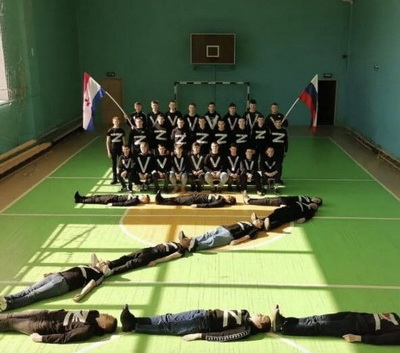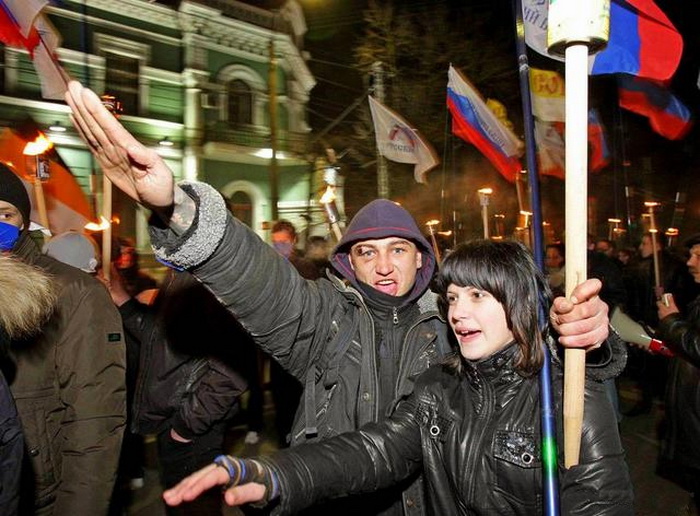In 77 years since the end of World War II and the Holocaust, matters of fascism are close enough since some survivors, perpetrators, and bystanders are still alive, but at the same time are far away enough to crystallize an amateur understanding of it as the ultimate evil with recognizable visible attributes.
Fascism, to a large extent, became a word either to offend someone rather than to point at someone’s political ideology, or to express emotions about some situation of unfreedom where nothing is permitted.
While historians and political scientists have already developed the generic definition of fascism as a movement with some ideological particularities (see Griffin, Roger, The Nature of Fascism, 1991), the general audience mostly cannot differentiate between ideology and regime, and between fascism, Nazism, and Fascism (the initial Italian movement), therefore being unable to recognize them when they come in colors different than usual.
After kidnapping Adolf Eichmann from Argentina, the Nazi hunt became an honorable mission. However, this business does not make one a good man with respect for diversity automatically — for instance, Efraim Zuroff from Simon Wiesenthal Center is at the same time a well-known Srebrenica genocide denier.
Since fascism, for many reasonable reasons, became understood as the ultimate evil, the threshold to be better than it is really low — it is enough to state that you are against it to be considered a good guy, no matter what else you do (see, for instance, the story of Belarusian dissident Roman Protasevich, support for whom was traded for five minutes of attention on the internet).
It is also enough to hunt for fascist visuals completely ignoring the essence. Is fascism bad because it uses solar symbols? No, it is because it fundamentally opposes human rights. Solar symbols do not kill, hate does. But many people fail to detect hate if it wears no swastika.
How the West enabled genocide in Mariupol with its misguided Azov obsession
Since Ukraine, a 40 million country, has some bunch of far-rightists in it, it became completely normal to overcover them in the media on the edge of advertising, at the same time being completely uninterested in the far-right on the Russian side and in the generally imperialistic and conservative (and recently having gone full fascist) politics of the Russian state.
I consider this victim-blaming and expressing Ukrainophobic sentiments, because when some faults exist everywhere (see Marine Le Pen’s electoral results) but are specifically attributed to a particular community — it is how hate works.
Appearing among the winners at the end of World War II, USSR allowed itself to receive the privilege to call itself victorious over fascism, at the same time conducting similar totalitarian politics inside the country and continuing to cooperate with various far-right movements all over the world.
Nobody except for historians recalled that it was Stalin and Hitler initially who signed a pact about mutual non-aggression and the partition of Poland.
This was the first step to strip the word “fascism” of its meaning, palming off another other interpretation — fascists are those who are the enemies of the Soviets.
In nowadays Russia, pobedobesie (obsession with victory) is one of the most important parts of the propaganda.
The Kremlin openly continues a form of Stalinism. This is easily visible if we look at the ongoing repressions of political opposition, the shutdown of Memorial (an organization focused on the remembrance of Soviet totalitarian crimes), the official prohibition of mentioning the Molotov-Ribbentrop pact, and — last but not the least — by the persecution of indigenous peoples on its territories.
Crimean Tatars, having returned home, but not yet recovered after their mass deportation in one night in 1944, are facing persecutions on ethnic and religious grounds in Crimea, illegally annexed by Russia.
The Kremlin deliberately builds the militarist narrative of a strong state which overcame Nazism — so strongly that it pushes aside the contributions of non-Russians, namely Ukraine and Baltic countries. The “never again” approach was never adopted in Russia, instead “We can repeat” is the official slogan. Putin openly stated that Russians could have won World War II without Ukrainians — a claim even Stalin had not allowed himself to pronounce.
The second step was done here: if anyone opposes the successors of winners over fascism, then they are fascists themselves.

It was this message that was bought all over the world when exposing Ukrainian fringe groups with some bad tattoos, hence overlooking the imperialist nature of the Russian state.
Putin’s speechwriters can literally rewrite Goebbels on totalen Krieg, state-funded media can openly call for the solution of the Ukrainian question, and all attributes of genocide are up for promotion — but since there are no swastikas, Nazi hunters, from journalists and OSINTers to regular folks on the internet, are fine with that.
Anton Shekhovtsov calls this state of things “moral procrastination,” understanding it as “giving preference to small exciting things instead of dealing with difficult issues that actually matter.”
I do not think, however, that it is the excitement that drives, at least first and foremost, this hunt for looking for some faults in the defending side of the ongoing genocide. For me, it is the historical and political illiteracy, mentioned above, interfering with Ukrainophobia and westsplaining that stem from our post-colonial history.
Ukraine is perceived as something in the Russian “sphere of influence,” Ukrainians were stripped of their political and personal subjectivity, with respective discourses imposed.
- What are your sources of knowledge on Ukraine? Are you sure you are aware of Ukrainian and Russian current social situations and history well enough to hold a meaningful debate? How good is your command of Ukrainian to gather your own information and form your own impression? If it comes to historical matters — is it good enough to understand Ukrainian in its non-contemporary versions? When you reject historical analogies offered by Ukrainians or offer your own analogies, can you elaborate on the meaningfulness of this?
- Do you take Ukrainophobia as seriously as other forms of discrimination, for instance, anti-Semitism? Can you replace Ukrainians with Jews in your statements and guarantee that the resulting sentences will not be anti-Semitic?
- Are you sure you do not require behavior not requested from any other democratic nation, or adherence to standards higher than required from any other democratic nation, including your own, from Ukrainians?
- What definitions of the terms “fascism,” “Nazism,” “far-right,” “nationalism,” “nation,” “right and left” etc. do you use? Are you sure that they are academically accepted and up-to-date? Do you check whether you and your dialogue partner agree on terms before starting the conversation? Which underlying assumptions do you have about these terms? Are they valid in every contemporary and historical context, so that you do not associate the word “nation” with “national socialism” automatically?
- Are you aware of the academic consensus in the matter you are going to discuss? Do you care not to appear in the situation where researchers are still debating and lacking some data but your profane knowledge already grasps the truth in its entirety?
- Are you sure you speak to Ukrainians in the same tone of voice as to your fellow citizens? What other factors (difference in sex, age, etc.) can influence your wording and overall manners?
- What are your emotions about the issues you want to discuss? Are you in touch with them? Can you name them and trace their source inside you? Is it timely to address this very issue at this very moment?
- To what extent are you aware of your cognitive biases, especially confirmation bias? What measures do you take to reduce it?
- What constructive contribution can you bring to the discussion? How can your suggestions fit into the legal and practical Ukrainian context? Are they achievable? Can you assure them they solve old problems without creating new ones? To what extent are you ready to participate in the solution?
Ukraine has shouted for help for eight years. We have been showing you the ruins of Donetsk airport. We have been showing you the faces of those killed or imprisoned for their ethnicity only. We have graves of our heroes in every small town, we have our veterans and displaced persons at every workplace. We have been enduring an enormous burden for eight years. We have been knocking on every door for eight years until the situation developed thus that we are at the edge of World War III.
This could not have happened if the world reacted better in 2014.
Now Russia bombs maternity wards under the pretext that Azov is there, the pretext it has been preparing for eight years, and some journalists who have no courage to report the war from the frontline are still wondering if I can comment about Azov.
No, I can not.

Hanna Hrytsenko is a Ukrainian sociologist, researcher of Ukrainian ultra-right movements, and gender activist.
Related:
- What is Azov Regiment? Honest answers to the most common questions
- How the West enabled genocide in Mariupol with its misguided Azov obsession
- Munich and the Molotov-Ribbentrop pact revisited, Part 3: The way to European catastrophe
- Russia’s call for genocide of Ukrainians outstrips Mein Kampf
- Putin has started “solving the Ukrainian question”
- Westsplaining Ukraine




